By Harriet Sese
Artificial intelligence (AI) has been making its way into healthcare for quite some time now. With the help of machine learning algorithms and natural language processing, AI has the potential to revolutionize the healthcare industry. AI can improve patient outcomes, reduce healthcare costs, and enhance healthcare experience.
One of the most significant advantages of AI in healthcare is its ability to analyze large amounts of data quickly and accurately. This can help healthcare professionals make more informed patient care and treatment decisions. Additionally, AI can automate routine tasks, such as appointment scheduling and medication reminders, freeing healthcare professionals to focus on more complex tasks.
In healthcare marketing, AI can be used to personalize the patient experience. AI can provide personalized recommendations and targeted marketing messages by analyzing patient data. This can improve patient engagement and loyalty, leading to better patient outcomes. With the potential benefits that AI can bring to healthcare, it is no wonder that many healthcare organizations are investing in this technology to improve patient care and outcomes.
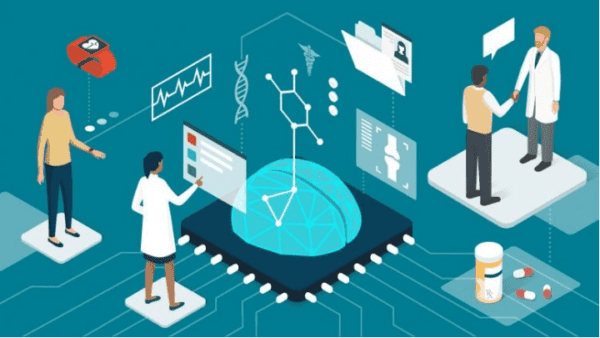
Artificial Intelligence in Healthcare: An Overview
Artificial intelligence (AI) has been making waves in the healthcare industry, revolutionizing healthcare delivery. AI is a branch of computer science that involves the creation of intelligent machines that can perform tasks that typically require human intelligence, such as visual perception, speech recognition, decision-making, and language translation.
In healthcare, AI has the potential to transform how healthcare is delivered, from improving care outcomes and patient experience to increasing productivity and efficiency of care delivery. AI can also help healthcare systems provide more and better care to more people and improve the experience of healthcare practitioners, enabling them to spend more time in direct patient care and reducing burnout.
One of the most promising applications of AI in healthcare is machine learning, a type of AI that allows machines to learn from data and improve their performance over time. Machine learning algorithms can analyze vast amounts of data, such as medical records, lab results, and imaging studies, to identify patterns and predict patient outcomes, disease progression, and treatment effectiveness.
Another way AI transforms healthcare is through automation, which involves using robots and other machines to perform tasks that humans typically do, such as surgery, medication dispensing, and patient monitoring. Automation can help reduce errors, improve patient safety, and enable healthcare practitioners to focus on more complex tasks requiring human expertise.
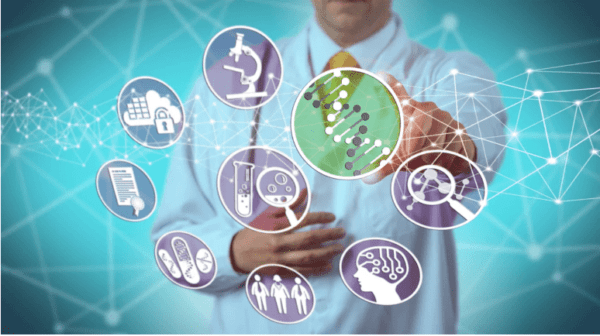
AI is poised to significantly impact healthcare in the coming years, improving the quality and efficiency of care delivery and helping healthcare systems meet the growing demand for healthcare services.
Related Posts:
Applications of AI in Healthcare
Artificial intelligence (AI) is transforming the healthcare industry by providing innovative solutions to improve patient care, optimize hospital operations and streamline healthcare marketing. Here are some of the applications of AI in healthcare:
AI Applications for Patients
AI-powered chatbots and virtual assistants have revolutionized the healthcare industry by providing round-the-clock patient support, addressing frequently asked questions, and streamlining appointment scheduling. Moreover, AI’s predictive capabilities enable healthcare providers to anticipate patient outcomes and pinpoint high-risk individuals, facilitating proactive interventions and tailored treatment strategies. This advanced technology not only enhances patient care but also contributes to improved clinical outcomes and overall healthcare efficiency.
AI Applications for Hospitals
AI plays a pivotal role in healthcare by enabling hospitals to streamline care delivery by automating administrative tasks, minimizing wait times, and enhancing patient flow. Furthermore, AI-powered systems can forecast patient demand, optimize staffing levels, and mitigate hospital readmissions. These advancements lead to operational efficiencies and improve resource allocation and patient outcomes.
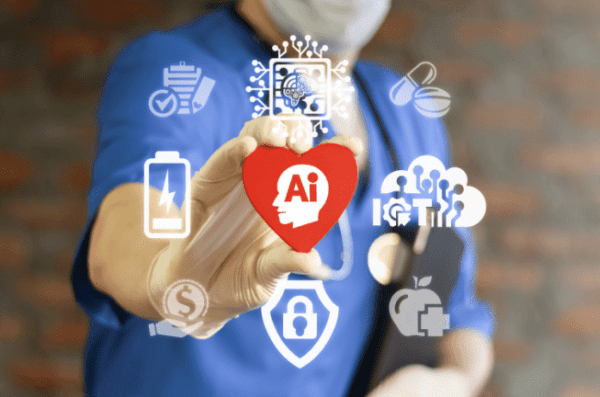
AI Tools for Care Delivery
AI has the potential to revolutionize hospital operations by automating administrative tasks, thereby reducing wait times and improving patient flow. Additionally, AI-powered systems can forecast patient demand, optimize staffing levels, and minimize hospital readmissions. These capabilities enhance operational efficiency, leading to better resource allocation and patient care.
AI Applications for Healthcare Marketing
AI-powered tools can help healthcare marketers target the right audience with the right message at the right time. AI can analyze patient data and identify trends, allowing marketers to create more effective campaigns. AI can also automate marketing tasks like email campaigns and social media posts.
OI is revolutionizing the healthcare industry by providing innovative solutions to improve patient care, optimize hospital operations, and streamline healthcare marketing. As AI continues to evolve, we can expect to see even more exciting applications in the future.
AI in Healthcare Marketing
Artificial intelligence (AI) has become integral to healthcare marketing strategies. As the healthcare industry becomes increasingly digital, AI can help marketers engage with consumers more effectively, optimize their campaigns, and improve their ROI. Here are some ways AI is transforming healthcare marketing:
Personalization
AI can analyze vast amounts of data to create personalized marketing campaigns that resonate with individual consumers. By analyzing consumer behaviour and preferences, AI can help marketers deliver targeted messages that are more likely to convert. For example, AI-powered chatbots can provide personalized recommendations based on a consumer’s health history and preferences.
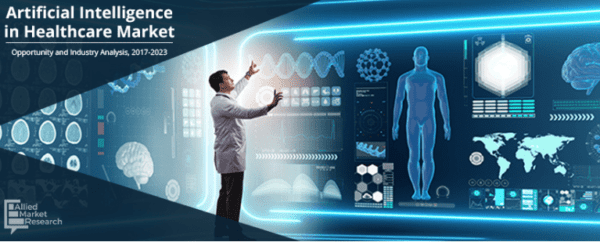
SEO-Friendly Content
AI is a game-changer for marketers, as it empowers them to craft SEO-friendly content that secures higher rankings in search engine results pages (SERPs). Through analyzing search queries and consumer behaviour, AI aids marketers in optimizing their content for targeted keywords and phrases, enhancing visibility and driving increased website traffic. This innovative approach elevates the effectiveness of marketing strategies and contributes to greater online engagement and brand exposure.
Consumer Engagement
AI is a powerful tool for healthcare marketers, enabling them to engage with consumers more effectively. For instance, AI-powered chatbots can deliver round-the-clock consumer support, address inquiries, and offer personalized recommendations. This proactive approach enhances consumer satisfaction and fosters greater loyalty, ultimately improving patient experiences and strengthening brand relationships.
Digital Health
AI is reshaping the landscape of healthcare delivery, consequently influencing healthcare marketing strategies. With the increasing shift of healthcare services to online platforms, marketers must innovatively adapt their approaches to reaching consumers. AI plays a pivotal role in this transformation by empowering marketers to identify emerging opportunities and refine their campaigns for digital health services.
By leveraging AI-driven insights and analytics, marketers can tailor their strategies to align with evolving consumer behaviours and preferences in the digital healthcare space, ultimately fostering enhanced engagement and driving the adoption of online healthcare services.
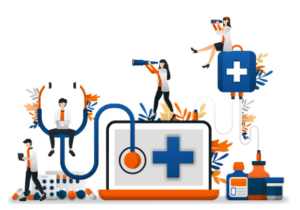
Improved ROI
Finally, AI is a valuable asset for healthcare marketers seeking to enhance their return on investment (ROI). Through analyzing consumer behaviour and campaign performance, AI enables marketers to pinpoint areas for optimization and refine their strategies accordingly. This data-driven approach not only aids in cost reduction but also elevates the overall effectiveness of marketing endeavours, ultimately leading to improved ROI and a more significant impact in reaching and engaging with target audiences.
In summary, AI is transforming healthcare marketing in many ways. By leveraging AI-powered tools and strategies, healthcare marketers can engage with consumers more effectively, optimize their campaigns, and improve their ROI.
Concerns and Challenges in AI Healthcare
As with any new technology, concerns and challenges come with implementing artificial Intelligence (AI) in healthcare. This section will discuss the significant problems and challenges healthcare professionals and organizations face when using AI in healthcare.
Security
One of the most significant concerns in AI healthcare is security. With the increasing use of electronic health records (EHRs) and other digital health technologies, there is a growing need to ensure that patient data is secure and protected. AI systems must be designed with security in mind to prevent unauthorized access or breaches.
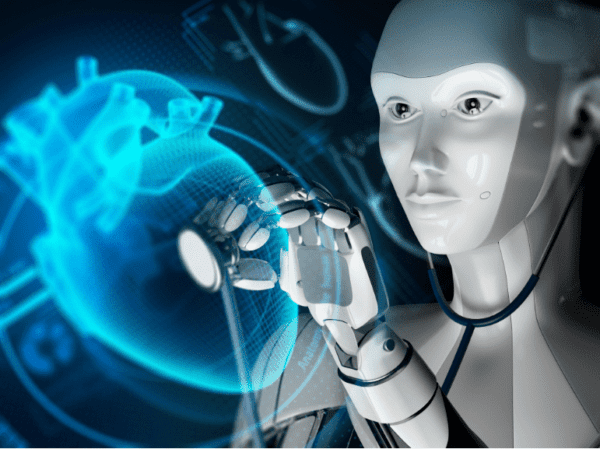
Data Governance
Another challenge in AI healthcare is data governance. Healthcare organizations must ensure their data is accurate, reliable, and up-to-date. They must also ensure that the data is used appropriately and that patient privacy is protected. AI systems must be designed to adhere to these data governance principles.
Data Privacy
Data privacy is another significant concern in AI healthcare. Patients must be assured that their health information is confidential and not shared without consent. AI systems must be designed to comply with data privacy regulations, such as the Health Insurance Portability and Accountability Act (HIPAA) in the United States.
Trustworthy AI
Finally, one of the most significant challenges in AI healthcare is ensuring that the AI systems are trustworthy. Healthcare professionals and patients must be able to trust that the AI algorithms used are accurate, reliable, and unbiased. AI systems must be transparent, and the algorithms used must be explainable to ensure that healthcare professionals and patients understand how the AI system arrived at its conclusions.
While AI has the potential to revolutionize healthcare, some significant concerns and challenges must be addressed. Healthcare organizations must ensure that AI systems are designed with security, data governance, privacy, and trustworthiness to ensure patients receive the best care.
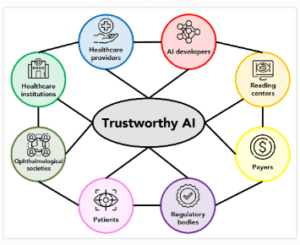
The Future of AI in Healthcare
Artificial Intelligence (AI) has already begun to revolutionize healthcare, and its impact is set to grow exponentially in the coming years. Here are some of the ways AI is expected to shape the future of healthcare:
Trends
The use of AI in healthcare is expected to continue to increase, with the global AI healthcare market predicted to reach $36.1 billion by 2025. This growth will be driven by the increasing availability of big data and the development of more sophisticated AI algorithms.
Prediction
One of the key benefits of AI in healthcare is its ability to predict and prevent health problems before they occur. This is achieved by analyzing large amounts of data to identify patterns and trends that can be used to predict future health outcomes.
Technology Innovation
AI drives innovation in healthcare technology, with new products and services being developed to improve patient outcomes and reduce costs. This includes the development of AI-powered medical devices, such as diagnostic tools and wearable sensors, and using AI in drug discovery and clinical trials.
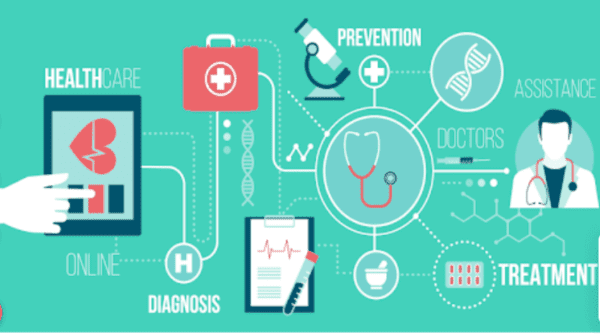
Big Data
The use of big data is essential to the success of AI in healthcare. By analyzing large amounts of data from electronic health records, medical imaging, and other sources, AI algorithms can identify patterns and trends that would be impossible for humans to detect.
In conclusion, the future of AI in healthcare is bright, with the technology set to transform how we prevent, diagnose, and treat diseases. As AI continues to evolve and become more sophisticated, it will play an increasingly important role in healthcare, helping to improve patient outcomes, reduce costs, and save lives.
